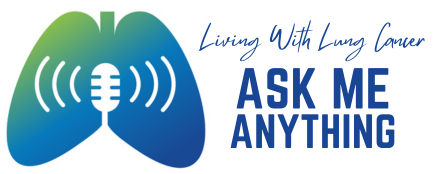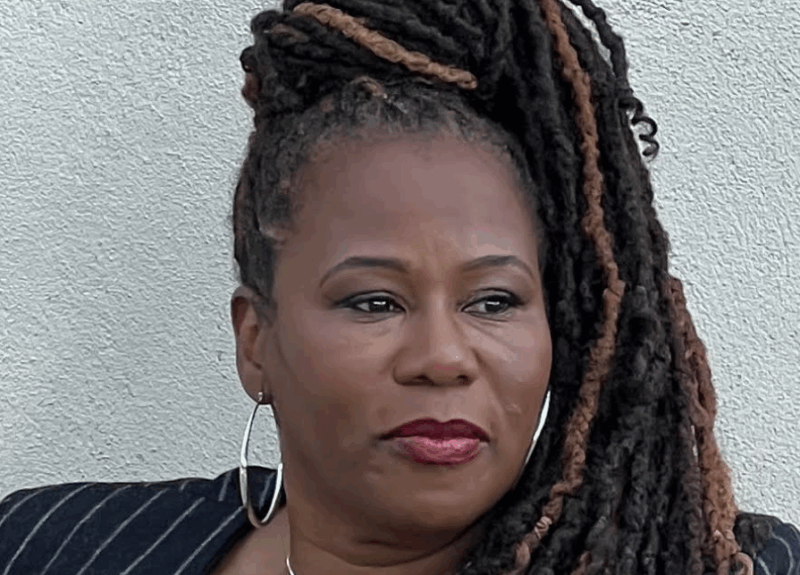Guests/Speakers
Annabelle Gurwitch – Host, Author & Patient Advocate
Annabelle brings compassion and candor to conversations about lung cancer, creating space for honest discussions about challenges patients face—from medical debt to emotional strain.
Visit her website: annabellegurwitch.com | Follow her on Facebook
Colette Smith – Lung Cancer Survivor & Community Advocate
Colette Smith is a dynamic lung cancer survivor, patient advocate, and community health champion who transformed her 2015 Stage 1A adenocarcinoma diagnosis into a powerful platform for change. As a never-smoker diagnosed through persistent self-advocacy, Colette’s mission is to emphasize the importance of patient empowerment and early detection.
What Side Effects Really Look Like When You’re Living With Lung Cancer
Side effects don’t end when treatment starts working—and for many, they don’t end even after treatment is over. In this episode of Ask Me Anything: Living With Lung Cancer, host Annabelle Gurwitch and advocate Colette Smith open up about the physical, emotional, and invisible side effects that shape day-to-day life with lung cancer.
Colette was diagnosed with Stage 1A lung cancer and underwent a lobectomy. Years later, she still experiences nerve pain, breathing limitations, and what she calls “seasons” where exhaling becomes difficult. Many people assume early-stage diagnoses come with an easy recovery—but as Colette explains, surgery has lifelong consequences that aren’t always visible.
Annabelle shares the other side of the survivorship spectrum: the chronic side effects of targeted therapy. From painful rashes to recurring UTIs that doctors once dismissed, she learned the hard way that patients often under-report symptoms to avoid dose reduction. She later discovered that lowering the dosage is sometimes the key to tolerable long-term treatment.
Their stories highlight a crucial truth: side effects are real, disruptive, and deeply personal—and patients need better communication, validation, and support.
Colette recalls being told by her surgeon,
“I haven’t seen that in my practice—it’s time to go back to work.”
Annabelle remembers a former oncologist saying her case “wasn’t worth” a second opinion from another doctor. Both experiences reveal how easily patient concerns can be minimized, even unintentionally.
The Emotional Side: Anxiety, Fear, and the Reality of an “Expiration Date”
Anxiety is universal—stage 1 or stage 4 doesn’t change the emotional weight of living with cancer. Annabelle describes the constant awareness that her treatment will eventually stop working. Colette explains how the fear of recurrence remains “right over her shoulder,” even 10 years post-surgery.
Both have found healing through acts of service—gardening, volunteering, creative work, and community support. Giving back creates purpose, structure, and a break from the internal noise.
Managing Side Effects When Treatment Doesn’t Cover It
The therapies that help manage muscle cramps, nerve pain, skin irritation, or stress—massage, acupuncture, specialized creams—are often not covered by insurance, even when they are the only meaningful relief patients have found. Annabelle and Colette emphasize the disconnect between medical treatment and quality-of-life care.
A key takeaway: Patients often have to build their own toolkit—and that shouldn’t be the case.
Community Wisdom, Practical Tips, and Patient Empowerment
When doctors don’t have answers, patients turn to each other. Online communities like EGFR-specific Facebook groups and advocacy networks share tips, lived experience, and emotional support that clinicians sometimes miss.
Annabelle and Colette encourage patients to:
- speak openly (even about taboo subjects)
- request second opinions
- ask about dose reduction
- report all symptoms early
- leave doctors who dismiss concerns
- stay connected to community
Because, as Annabelle says:
“An empowered patient is a patient who has a better quality of life.”



